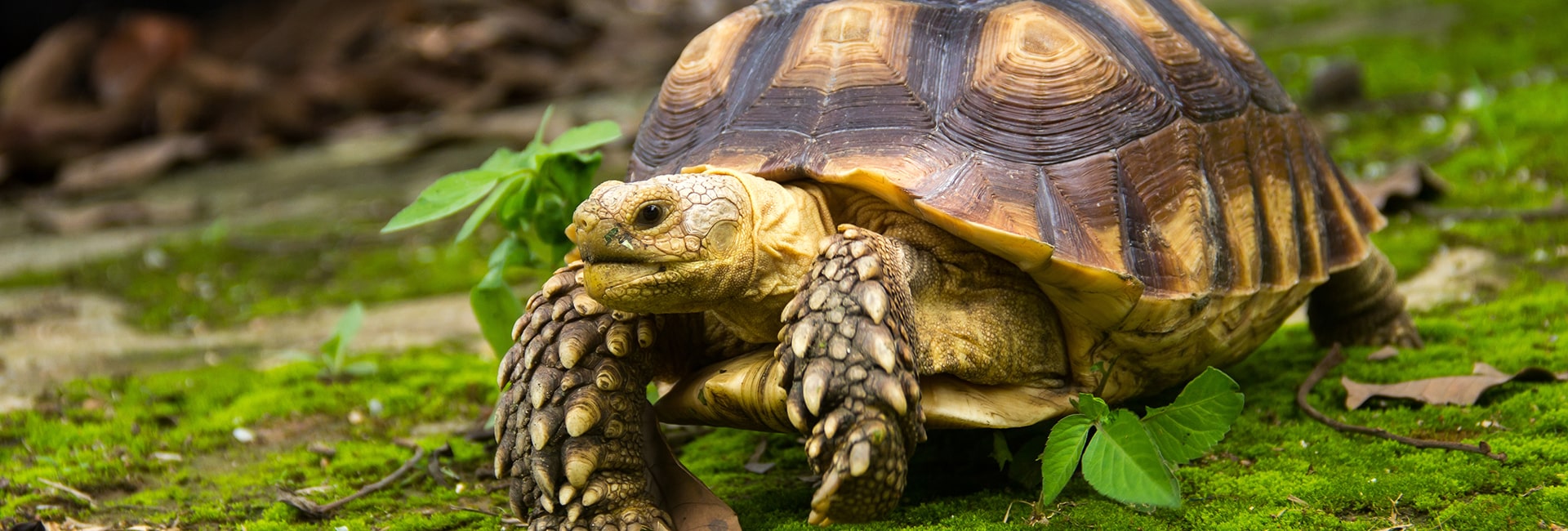
Turtles & Tortoises
Land turtles and tortoises can make great first reptile pets. They are reasonably easy to care for, and live a long time. It is not uncommon for people to come in and say that “This tortoise was my parents for 50 years and now I am caring for it”. In San Diego they are best kept outdoors for most if not all of the year as long as they have an enclosure where they are safe from predators. Tortoises do well with lots of sunshine, fresh air and a good balanced diet. Some tortoises are shy, while others are outgoing, but all are fascinating and fun to watch. Most tortoises are herbivorous but their dietary needs vary depending on the species. The box turtle for example, is omnivorous and requires both insects and plants in their diet. No matter the species, it is highly recommended that all land tortoises eat a balanced pelleted food for a significant portion of their diet.
Common signs of illness for all turtles include:
-
any change in behavior
-
inactivity
-
weakness
-
weight loss
-
nasal discharge
-
crusty nostrils
-
difficulty breathing
-
eye discharge or eye swelling
-
failure to grow properly
-
elongated beak
-
abnormal shell growth
-
soft shell
-
not eating or decrease in appetite
-
cloacal prolapse
-
constipation or loose stools.
If any of these signs develop please make an appointment to have them evaluated.
Common land turtle and tortoise diseases include:
-
upper respiratory infections
-
pneumonia
-
eye infections
-
internal parasites
-
bladder stones
-
metabolic bone disease
-
shell and beak growth abnormalities
-
reproductive problems (retained eggs)
-
thermal burns from heat lamps
-
bite wounds from predators or pets
-
vehicle trauma
-
cloacal or hemipenal prolapse
-
liver disease
-
kidney disease.
Here are some helpful topics regarding turtles and tortoises:
EAR ABSCESSES IN TURTLES AND TORTOISES
COCCIDIA PARASITES IN REPTILES
If you would like to support a San Diego non profit dedicated to turtle and tortoise care or to adopt an tortoise please visit:
SAN DIEGO TURTLE AND TORTOISE SOCIETY.
To find out more about the species you are interested in enjoy reading these care sheets provided by the San Diego Turtle and Tortoise Society:
CALIFORNIA DESERT TORTOISE CARE SHEET
AFRICAN DESERT TORTOISE (SULCATA) CARE SHEET
RED FOOTED/YELLOW FOOTED TORTOISE CARE SHEET
Water turtle care is more challenging than that of land turtles and tortoises, as caring for the water quality is essential. These turtles are commonly kept in indoor aquariums or outdoor ponds, but all need proper water filtration systems and frequent water monitoring and maintenance. These turtles are a delight to watch and can make great pets. Like land turtles and tortoises, water turtles can also live a long time, and can be very personable. Water turtles are omnivorous and should eat fish and insect protein, as well as vegetables. It is highly recommended that all water turtles eat a balanced pelleted food for a significant portion of their diet.
Common disease in water turtles include:
-
vitamin A deficiency
-
ear abscesses
-
eye infections
-
metabolic bone disease
-
shell and beak growth abnormalities
-
reproductive problems (retained eggs)
-
failure to grow properly
-
soft shell
-
bacterial and fungal shell and skin infections
-
rock ingestion
-
pneumonia
-
internal parasites.
To find out more about water turtle care, please enjoy reading these care sheets provided by the San Diego Turtle and Tortoise Society.
